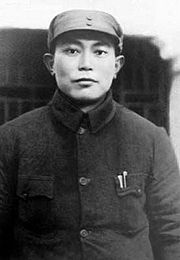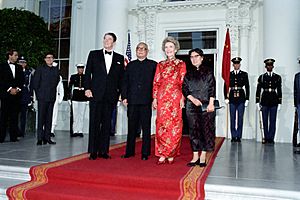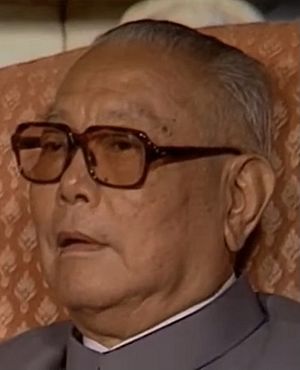Li Xiannian facts for kids
Quick facts for kids
Li Xiannian
|
|
|---|---|
|
李先念
|
|
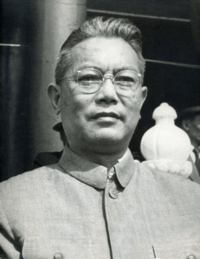
Li in 1954
|
|
| 3rd President of the People's Republic of China | |
| In office 18 June 1983 – 8 April 1988 |
|
| Premier | Zhao Ziyang Li Peng |
| Vice President | Ulanhu |
| Leader | Deng Xiaoping |
| Preceded by | Liu Shaoqi (as State Chairman in 1968) Ye Jianying (as NPC Chairman) |
| Succeeded by | Yang Shangkun |
| 5th Chairman of the Chinese People's Political Consultative Conference | |
| In office 6 April 1988 – 21 June 1992 |
|
| Preceded by | Deng Yingchao |
| Succeeded by | Li Ruihuan |
| Vice Chairman of the Chinese Communist Party | |
| In office July 1977 – September 1982 |
|
| Chairman | Hua Guofeng Hu Yaobang |
| Member of the National People's Congress |
|
| In office 15 September 1954 – 25 March 1988 |
|
| Constituency | Hubei At-large |
| Personal details | |
| Born | 23 June 1909 Hong'an, Hubei, Qing Dynasty |
| Died | 21 June 1992 (aged 82) Beijing, China |
| Nationality | Chinese |
| Political party | Chinese Communist Party (1927–1992) |
| Spouses | Shang Xiaoping (Chinese: 尚小平) (div) Lin Jiamei |
| Children | 4, including Li Xiaolin |
| Li Xiannian | |||||||||
|---|---|---|---|---|---|---|---|---|---|
| Chinese | 李先念 | ||||||||
|
|||||||||
Li Xiannian (pronounced Lee Shee-en-nee-en; June 23, 1909 – June 21, 1992) was an important Chinese political and military leader. He served as the President of the People's Republic of China from 1983 to 1988. He was also a key member of the Communist Party's top leadership for many years.
Li started working as a carpenter's helper when he was a teenager. He joined the Communist Party in 1927 and became a soldier. He was a successful military commander during the Second Sino–Japanese War and the Chinese Civil War. After the People's Republic of China was formed, he held important government jobs. He was the Minister of Finance and a Vice Premier. He was considered one of the "Eight Elders" of the Communist Party, who were very influential leaders.
Contents
Who Was Li Xiannian?
Early Life and Military Career
Li Xiannian was born into a poor family in Hong'an, Hubei Province, China. To help his family, he worked in a carpenter's shop when he was young. In December 1927, he joined the Chinese Communist Party.
He became an army captain and a political leader in the Chinese Red Army. He took part in the famous Long March. After this, he studied at important military and party schools. Li fought bravely in both the war against Japan and the Chinese Civil War. He played a big role in many victories for the Communists.
Becoming a Leader in China
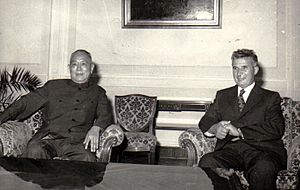
After the Communist Party won the Civil War, Li Xiannian became the Governor of his home province, Hubei. He also led the military forces there. In 1954, he moved to Beijing to join the central government.
He became China's Minister of Finance, managing the country's money. He also served as a Vice Premier, a high-ranking government official, for many years. Even during the difficult Cultural Revolution, he kept his position. He was one of the few civilian officials who continued to serve throughout that time. In 1976, Li helped to remove a powerful group known as the "Gang Of Four."
Role in Post-Mao China
After Mao Zedong died, Li Xiannian supported Hua Guofeng, who became the new leader. Li was a key economic advisor to Hua. However, another powerful leader, Deng Xiaoping, soon became the most important figure in China.
Li Xiannian believed in a strong government control over the economy. He preferred a system where the government planned everything, similar to the Soviet Union. He was not a big fan of Deng Xiaoping's ideas for more open economic changes. Li thought that some of Deng's reforms were too radical. He often disagreed with leaders like Zhao Ziyang, who wanted to bring in more Western ideas and less government control.
Serving as President
In 1983, Li Xiannian became the President of China at age 74. While the role of President was mostly ceremonial, Li used his influence to support his political views. In 1985, he made a historic visit to the United States, meeting with President Ronald Reagan. This was the first time a Chinese head of state visited the U.S.
As the years passed, Deng Xiaoping encouraged older leaders to retire. Li stepped down as President in 1988. He then became the Chairman of the Chinese People's Political Consultative Conference, another important political body. During the Tiananmen Square protests of 1989, Li was among the senior leaders who supported a strong response to the demonstrations. He continued to serve in government until he passed away in 1992.
Family Life
Li Xiannian had four children. His youngest daughter, Li Xiaolin, is also involved in public service. She is the President of the Chinese People's Association for Friendship with Foreign Countries.
Death and Legacy
Li Xiannian died on June 21, 1992, just two days before his 83rd birthday. His funeral was attended by many important political figures. He was cremated after the service.
Awards and honors
 Order of the Star of the Romanian Socialist Republic, 1st Class (Romania, 1984)
Order of the Star of the Romanian Socialist Republic, 1st Class (Romania, 1984)
Images for kids
-
Li with Nicolae Ceaușescu prior to the 30th anniversary of the liberation of Romania, 22 August 1974
See also
 In Spanish: Li Xiannian para niños
In Spanish: Li Xiannian para niños
 | James Van Der Zee |
 | Alma Thomas |
 | Ellis Wilson |
 | Margaret Taylor-Burroughs |


